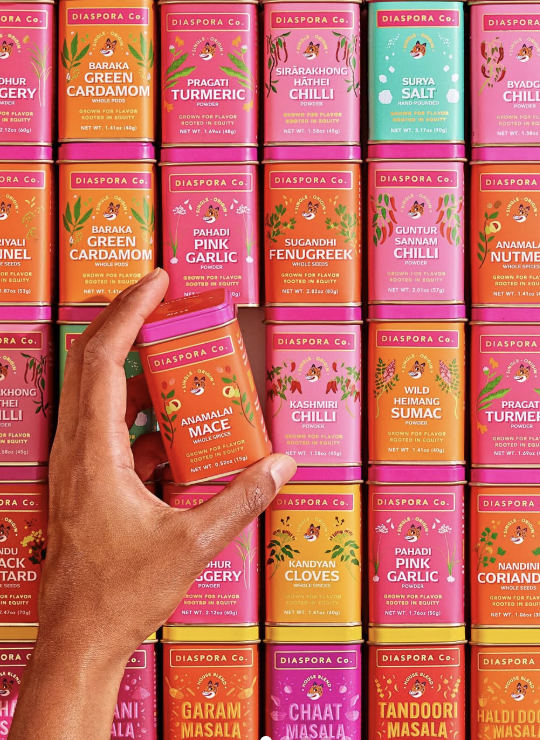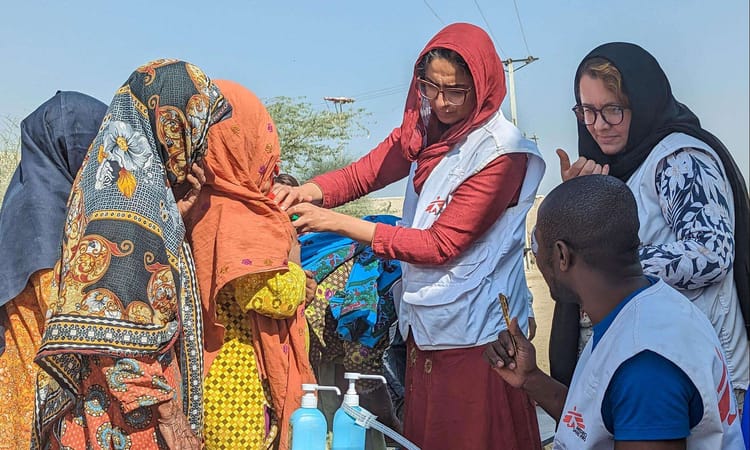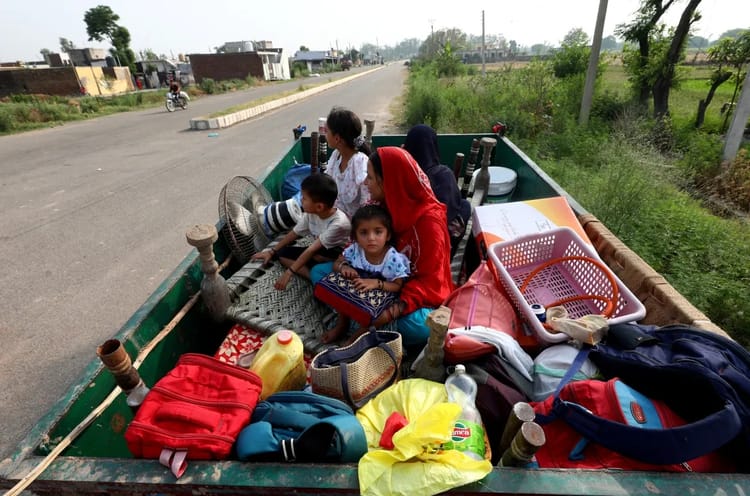The Spice Trade: A Journey from Colonization to Sustainability with Diaspora Co.

When Sana Javeri-Kadri first moved to the US from India, she felt what she described as a ‘cliched diaspora angst,’ - a feeling that’s very common for immigrants leaving their home countries who find themselves stuck between maintaining their old life versus exploring something new. For many immigrants that balance often comes through food and the idea of ‘home food’ is a nostalgic one. It can bring up questions around maintaining that ‘authentic’ flavour of home as part of retaining your culture or questioning why “chicken tikka masala” seems to be the most popular South Asia dish available despite the region’s food diversity.
Javeri-Kadri also became part of the same conversation but instead of looking at the dishes themselves, she began to question what was really going into making them. “The spice trade at large has been from the perspective of the colonisers. There’s this idea of the exotic east,” she says. So in an effort to connect more to home, and help others do the same, Javeri-Kadri decided to change the way food spices and ingredients reached consumers and in doing so started Diaspora Co. a South Asian spice company, named for that diaspora angst she had struggled with in 2017. Delivering to the US, UK and Canada, Diaspora Co sources 150+ spices across India and Sri Lanka and in doing so, allows consumers to really understand the full story of what’s shaping their food.

For Javeri-Kadri it’s not so much about maintaining authenticity with recipes. As she says, “The recipe in the US that's been adapted and changed is also valid and also super tasty, and so is some grandmother's recipe in some galli of Bombay.”
She adds, “ Why are they [fusion recipes] less valid? Asha - an indian adoptee who’s never been to india in her life, creates recipes just as delicious as any, and we want to use it to talk about flavour. After all, if we're really chasing authenticity tomatoes should be removed, they are a relatively new addition.”
Instead she wants to focus on the concept of authenticity through maintaining the quality of spices and through preserving the tradition of sustainable farming in the region by supporting her farm partners and helping them optimize their produce.
She also points out that there’s still so much that’s misunderstood about spices including just how to maintain their freshness. Commercially available spices like Cardamom often lose their freshness from being ground up for so long or are not always high quality. She also talks about the importance of understanding where food comes from when it comes to prioritising sustainability. “It’s very important to say that our pepper comes from this specific part of Kerala and they should get credit for that. When we say our farm partners have been growing this for 35 years that's only the tip of the iceberg, - it's been growing indigenously for 1000s of years,” she says.
Food in South Asia is more than just a business or a necessity - it is a way of life and tradition, of building love and bringing families together. For Dharmesh Sakariya, one of Diaspora Co’s largest farm partners, no where did this become more obvious than when Javeri-Kadri named the coriander they source from his farm after Nandini, their family cow, who the founder had met when she was just a calf. Having been in the farming business for 8 generations, Sakariya took a lot of pride in returning to his organic farming roots which had been lost in recent generations.

Sakariya’s farm is the company’s main source for chilli, coriander and fennel, and the last one happened by chance. In an effort to build a more sustainable farming practice, Sakariya shares that they limited buying from outside and instead tried to grow whatever they could at home, and fennel was one of those ingredients. When Javeri-Kadri partnered with them for the coriander, she eventually let them know she would like the fennel as well, but initially Sakariya’s mother pointed out that they only grew enough for home. However when the Diaspora founder took a sample to Bombay and came back with rave reviews, she convinced Sakariya’s family to at least start with a small amount, and it took off from there.
For Sakariya the best part of working with Diaspora is the focus on quality and across the country, Kashmiri saffron farmer Raqib Mushtaq Mir agrees. Mir came into the farming business with his father and initially grew it through his website Kashmir Box which helped the family branch out into e-commerce, and got them featured in an online article which is how Javeri-Kadri found out about them.
2 years ago, Javeri-Kadri visited Kashmir to attend Mir’s wedding, and shares how for her, her relationships with her farm partners go beyond the product itself. Mir’s partnership with Diaspora also started at a time when a bad deal had led to his family not being paid which meant the business was struggling significantly.
“We had family losses, and Diaspora helped us get back on our feet again after someone didn't pay us. We had to sell our house and if they had not supported us my career would be over,” he shares.

Now, he takes pride in the high quality of saffron he can provide to the company, because they’re willing to pay what it takes to create that quality. “We get control over prices because there’s no middlemen in the Diaspora process. Middlemen don't let us earn,” Mir says, adding “local markets wanted a lesser price and compromised on quality, so we were unable to get the quality we wanted to people and Sana helped us do that.”
Javeri-Kadri is all too aware of the exploitation South Asian farmers often face when it comes to providing their product, which is why that personal relationship is so important to her.
“Visibility gives them a sense of pride. For all of the farm partners seeing their name on the jar and on the website is such a big deal because they’re so used to selling to the mandi,” Javeri-Kadri says adding, “our job is to push the conversation and to get our customers to ask questions. It's about customers demanding better.”
Diaspora may be just one company, but by changing the conversation around the spice industry, it opens the door to a greater push for a decolonised food system, that allows indigenous farmers and traditions to thrive beyond just corporate profit.
Anmol Irfan is a freelance journalist, editor and the co-founder of Echoes Media. Her work focuses on marginalised narratives in the Global South, looking at gender, climate, tech and more. She tweets @anmolirfan22






Member discussion